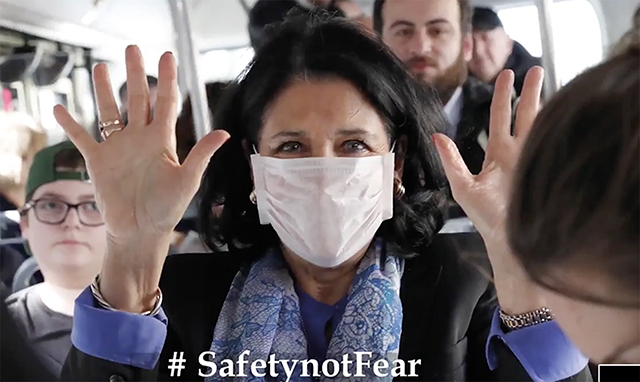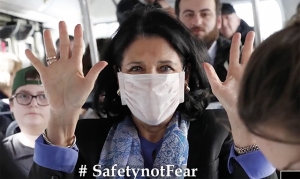Coronavirus Updates – Georgia & The World
The reports of March 9 say that coronavirus has spread to over 110 countries worldwide, infecting more than 110,000 people, of which 62,300 have recovered and 3831 have died.
The majority of the fatal cases have been reported in China – the country now has up to 3100 lethal cases. However, the spread of the virus in the country is slowing down as the state reported 40 new cases on Monday, the lowest number since the National Health Commission started publishing China’s coronavirus data on January 20. Outside Hubei Province, which is the epicenter of the original outbreak of Covid-2019, China has reported no new locally transmitted cases, now for the second straight day. Following up with the positive side, the novel coronavirus has urged the country to further advance its technologies. Al Jazeera has reported that a Chinese company has claimed to have developed the country's first facial recognition technology that can identify people when they are wearing a face mask, and so help in the fight against the disease. What’s more, the Disneyland in Shanghai which shut its doors on January 25, is starting to accept guests again – it has opened some of it shops, restaurants and resort facilities. Of course, everyone has to go through major health checks and the Disneyland is only functioning on a limited basis, but it still seems like a big step forward.
The rate of infected also appears to be slowing in South Korea. North Korea on the other hand, granted having reported no confirmed coronavirus cases so far, has evacuated 60 diplomats out of the country. AFP has reported that for that reason, on Monday, several embassies in North Korea were closed.
Moving west on the world map will leave us feeling less hopeful about the new coronavirus, as Iran reported 49 new fatalities on Monday morning, bringing the country’s death toll to 194. The latest reports assured international society that the coronavirus cases in Iran were not more than 7000, however much of international media, like The Atlantic, writes that the cases in the country are higher in number than their government is letting on.
Europe continues to think of more drastic measures to take up, as the continent as a whole tries to freeze the spread of the coronavirus. Despite the efforts, Albania has reported its first case, while the number of infected in France, Germany, Italy and in other countries of central Europe continues to grow.
Italy, the source of the European outbreak of coronavirus, has some 16 million people in the country’s geographical north in quarantine. 133 deaths were reported on Sunday, bringing the country’s total to 366. Over 7000 people in the country have been confirmed as having the virus so far.
Both Italy and France have urged Europe to unite in the fight against coronavirus. The French Finance Minister Bruno Le Maire said that a “massive economic stimulus” plan is needed to defeat the virus. He has also reported that the plan will be discussed on March 16, when the French Minister meets his European counterparts.
In the United States, coronavirus cases have reached and surpassed 500, and the country’s death toll has risen to 22. Texas Senator Ted Cruz and Arizona Representative Paul Gosar put themselves into a 14-day quarantine, having determined that they had contact with a man at the Conservative Political Action Conference who later tested positive for the coronavirus.
Georgia continues its battle against the coronavirus. Monday’s reports show that the country has 15 confirmed coronavirus cases, one of the patients at the Tbilisi Infections Hospital being Amiran Gamkrelidze’s son Nikoloz. Amiran Gamkrelidze is the Director of the National Center for Disease Control of Georgia, and his son, who announced on Saturday his having tested positive for Covid-2019, is the Head of Supervisory Board at Evex.
The special website created by the Health Ministry of Georgia reports that the country has 141 people in quarantine and 51 in in-patient care.
Worldometers website claims that there is one patient in Georgia in a serious condition. Medical Director of the Tbilisi Infections Hospital, Marina Ezugbaia spoke about the patient’s health to reporters on Monday, saying that although the condition of the 44-year-old man (the fourth Georgian citizen to get infected) is still serious, his life is not at any particular risk.
Ezugbaia further assured Georgian society that all the coronavirus patients in Georgia are in a stable condition, and their lives are not being threatened by the disease.
“The condition of the first three patients is mild and stable. The condition of the fourth patient with confirmed pneumonia remains severe, but not deadly. His fever persists at 38-39 degrees. According to laboratory data, his condition is stable. His life is not in danger at this stage, though constant observation and monitoring are essential,” said Ezugbaia.
Other coronavirus-infected patients show various clinical symptoms: fever, cough, cold and sore throat. Three patients have been diagnosed with pneumonia and are being treated. Although there are no life-threatening complications at this stage, it does not give us sufficient reason to remain calm, as this disease is characterized by progression,” she added.
On Monday, two citizens of Bulgaria were admitted to the Gori Military Hospital. The latest reports claim that the hospital has 22 patients in its quarantine zone, four of which are militants, two citizens of Bulgaria, and one of Iran. Four citizens of Iran left the hospital on March 7.
While the special coronavirus council of Georgia has strictly recommended cancelation of official and work trips abroad, unless an emergency, the country’s President has come up with a new challenge titled #SafetynotFear.
President Zurabishvili has published photos and videos on social media, showing her traveling on public transport with a face mask on her face.
"Challenge to world leaders: let’s spread #SafetynotFear. With the new #Coronavirus on top of world news, let’s show people that safety means remaining calm and being responsible by continuing our lives while following @WHO recommendations," Zurabishvili tweeted on her official Twitter account.
She challenged international leaders to join the campaign, in particular, Julie Payette, Governor General of Canada; Kersti Kaljulaid, President of Estonia; Sanna Marin, Prime Minister of Finland; Ursula von der Leyen, President of the EU Commission; Miri Regev, Minister of Culture and Sport of Israel; Emmanuel Macron, President of France; Tedros Adhanom, Director General of WHO; and Erna Solberg, Prime Minister of Norway, all of whom she asks to spread safety, not fear.
Medics worldwide are now saying that the death rate of the new coronavirus is actually below 1%, since it’s evident that many people who have mild symptoms and appear to be dealing with the disease just fine on their own, don’t seek any help and so their cases go unreported. Although the death rates among confirmed cases fail to tell us about the precise risk in any single group, their patterns reveal who is most at risk. The data shows that the elderly, patients with pre-conditions like vascular diseases, diabetes, respiratory problems, and oddly enough, men in general, are more at risk of coronavirus cases resulting in fatality.
The death rates have so far been lowest for the under 30s: eight deaths in 4500 cases. Deaths were at least five times more common among people with diabetes, high blood pressure or heart or breathing problems. A slightly higher number of deaths among men compared to women has also been reported. It has also been noted that medical staff who treat patients and get exposed to a lot of virus cases are more at risk. But even with these rates at hand, the statistics show that 90% will recover.
The main advice to keep yourself from being infected remains to wash your hands with soap and water for at least 20 seconds, and try to do this every time you enter a new environment (come back home, arrive at work…). The virus can linger for 48 - 72 hours on a hard surface, such as the hand rail in the tube, though less time on a soft surface. Avoid touching your face to prevent the virus getting into your nose, mouth or eyes.
There is still no specific cure for the new coronavirus almost three months after it was first detected, though many countries are working to create a special vaccine for it.
The US government’s chief scientific adviser, Sir Patrick Vallance, said he did not think a working vaccine to protect people from the coronavirus would be produced in time for the current outbreak, but that a timeframe of a year to 18 months “was not unreasonable to assume,” according to The Guardian.
By Nini Dakhundaridze












